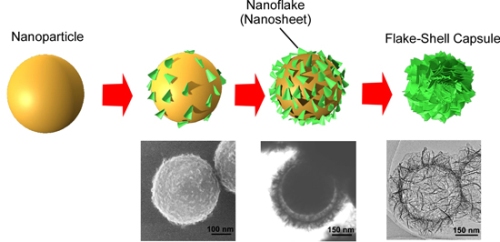A research team led by Dr. Qingmin Ji from the Supermolecules Unit of the National Institute for Materials Science’s International Center for Materials Nanoarchitectonics, and Professor Frank Caruso from the University of Melbourne have created an innovative elastic capsule utilizing a flake-shaped inorganic material having a nanometer thickness.
 Formation of the flake shell. The flake shell is formed by dissolving silica nanoparticles from the outside and precipitation/aggregation of nanosheets in the surrounding area.
Formation of the flake shell. The flake shell is formed by dissolving silica nanoparticles from the outside and precipitation/aggregation of nanosheets in the surrounding area.
According to test results, the release time of drugs can be increased by manifold and controlled freely by utilizing this capsule. Hitherto, capsules are created using organic materials such as polymers and fats and inorganic materials such as silica. However, capsules made of inorganic materials are tough and hard so that it is difficult to modify their structures according to conditions. Conversely, structural modifications are possible with organic capsules due to their flexibility but they have low mechanical strength.
To overcome these issues, the researchers developed the soft capsule using a fluffy assembly of silica nanosheets. This novel capsule’s structure can be controlled freely although it was made of silica, which is mechanically stable. The spaces between the silica nanosheets form pores in the outer wall. When the capsule is cooled and heated, it gets contracted and expanded, which in turn controls the size of the pores over a broad range by altering pH to different levels.
In the test, the researchers were able to extend the release period of the anticancer drug DOX by manifold using this novel capsule when compared to traditional porous capsules that have simple structure. They were also able to control the amount of drug storage and drug release period by adjusting the capsule’s pore structure, thus varying the routes of drug release. The study results will be reported in the online version of the journal, Small.